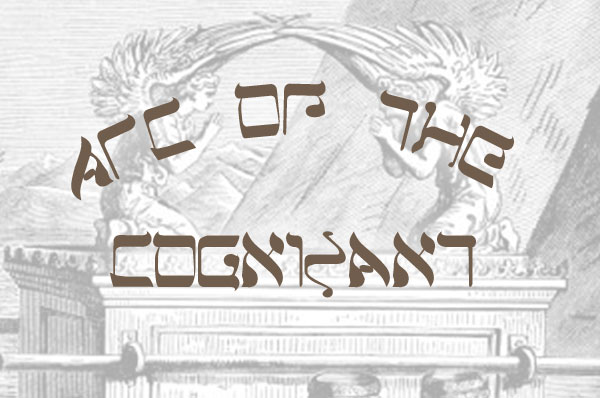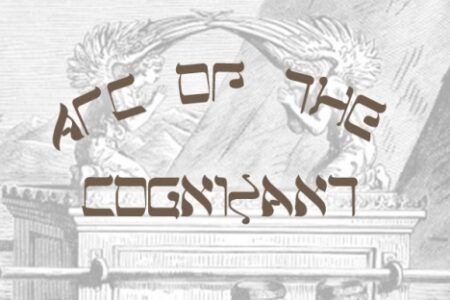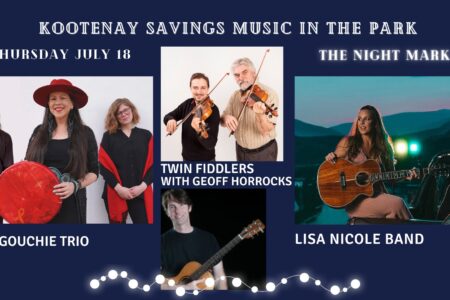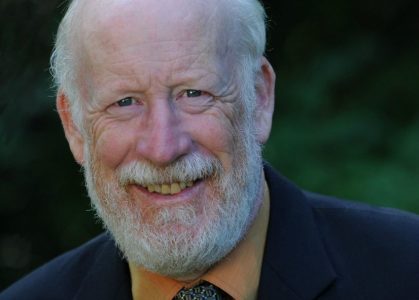Existential ego at the end of time
Humanity ascends from the realm of necessity to the realm of freedom– Friedrich Engels, in Socialism: Utopian and Scientific
The meaning of Life is discovering our gift; the purpose is to give it away– chalkboard on Baker St. in Nelson
My last column described the Baby Boomers at some length, so today I will sound off with comments on that generation (my own) and its materialist excess–hyper-capitalism and ego-drive.
Many readers are likely aware of a Boomer who has made his particular niche in the marketplace by coining the term “Zoomer.” A Zoomer is a Boomer who’s still youthful in all ways but one – not the way of counting birthdays, but in attitude, energy, drive, and cutting-edge, resourceful inventiveness. The man who leads these wonderful people is Moses Znaimer, a grey-haired, pony-tailed man pushing unembarrassed self-promotion as a character attribute. He declares Zoomers will save the planet.
Another Boomer leading his peers to greater heights of self-esteem is Richard Florida, whose favoured phrases are “the creative class” and “high bohemians”. Florida has been taken up as a guru by such Generation X mavens in Canada as Jian Gomeshi and George Strombolopoulos of CBC celebrity, and in the rock star stratosphere by Bono.
Personally, I think the word couplet “bohemian bourgeois” is the best descriptor of Boomer achievers who are immensely affluent as a class, poseurs of anti-materialist hip while amassing personal fortunes. The characters in the film The Big Chill personify this perfectly.
After Boomer prosperity comes New Age spirituality.
The single phrase describing how Boomers latched onto “spirituality” and “Eastern wisdom” and “the inward journey” — one I have used ever since I came across it — is the title of a book by a Tibetan Buddhist named Chogyam Trungpa. This rinpoche, known well in Nelson among Dharmadatu and Shambhala students, in 1973 published “Cutting Through Spiritual Materialism.”
Spiritual Materialism. Yes! Alas, though the monk diagnosed the illness, he could not offer a cure, because the cure is not time-limited and glamorous like a retreat to Sedona or Esalen, or a Peruvian ayahuescero’s shamanic guided-tour-of-the-mind. It cannot be commodified or find a market niche.
Boomers, and those who aspire to their affluence in the generations that follow them, are not capable of spirituality. Why not? Their ego gets in the way, almost invariably.
Our modern ego-development is unique in world history. I truly do not see how much of the teaching of other cultures, earlier eras, and alien minds, can make headway against modern Western bourgeois consciousness of Self. Self is qualitatively different in the rich nations’ middle-class consciousness.
The individual Self in capitalism since the early modern era, beginning with Columbus, Luther, Calvin, Da Vinci and Machiavelli, is a one-of-a-kind historic phenomenon. Our egos are not like earlier ones, nor like non-Western types. We have grown material and psychological ingredients in ego now that were not present in the consciousness of India, China, Persia, or in Europe during the ages before capitalism and science altered the landscape.
What the Buddha taught, or Jesus, or St. Francis, or any mystic one cares to name, is not irrelevant. But the mind that can be transformed by the meditation and prayer, the asceticism and discipline, of those teachers, is a rare commodity in bourgeois materialist consciousness in the West.
Ego that can be balanced and made wholesome by strict spiritual practice, is an ego without a sense of boundless freedom, but that is the kind of ego our Western cultural tradition has nurtured so well and made so common. Freedom of choice has become less of a fantasy and more a realistic possibility – ever since the power of capital, science, technology, and the national State, burst upon the scene of human history in the centuries after Europe colonized the New World. With that came new ideas rendering organized religion impotent.
Rationalism, Romanticism, Socialism, Existentialism, want no religion dictating to the freedom of the individual. Liberation is sovereign in the new world order, beginning around 1800. The freed ego defines us. As if on cue to demonstrate what such an ego might be, Napoleon Bonaparte bestrode Europe in 1810. Our exemplar today of middle-class materialist ego might be any celebrity –an athlete, moive or music star, super-achieving capitalist entrepreneur. Any of those are likely very nice people. They know how to present nicely. It is an occupational talent.
A bourgeois mind – and by 1960, all minds grew into this category in nations of the West, no matter what actual social/economic “class” a person might own – is a mind with a powerful sense of Self. Our new science of psychology focused a laser beam of rationalist research on theories of the ego. Carl Jung, the darling of New Agers among the classical psychologists of the 20th Century, was a prophet of the merits of “individuation;” that is, each of us becoming a fully-actualized Self. This is a hallmark of modern mental maturity in the teaching of psychologists. “Individuation allows ever more freedom – you, free to be you, and me, free to be me,” a student of Jung has written. “Be yourself!” was a ‘60’s slogan.
I believe that this type of ego, so normal now as to be unnoticeable and very difficult to perceive, is enforced, fed, nourished, over-fed and hyper-inflated, by material possessions. And surely no one doubts that we possess a vast array of – what else to call them? – possessions. “You are not what you own” is a fine, uplifting and noble sentiment. It is my observation that few people live by this belief.
Even that wonderful compendium of wisdom, The Desiderata, tells us that your career is a “real possession in the changing fortunes of time.” Chogyam Trungpa was dead right: when a bourgeois mind encounters a spiritual teaching, the learning becomes a mark of personal identity for the ego. My meditation is a material thing. When one says “I have a meditation practice” one feels self-esteem and expects esteem from others. There are Branded clothes for meditation, yoga, trips to Thailand and India.
It is not only material that is possessed. Not only having and owning defines us, but knowing and experiencing tell us — and others — who we are. Just as important to our ego’s sense of selfhood as our “stuff” is the experiences we “have.” An advertisement for an SUV sums it up nicely, showing how having a vehicle ready for adventure and extreme uses allows you to “tell better stories.” Going to the top of Everest, diving to the bottom of the Marianas trench, flying in a Soviet space shuttle to see the earth from space – all these experiences and more are within your reach if you have the money and the time. Thousands of people in the middle classes of the West have been “empowered” to do these things in the past few decades. Extreme sports, extreme adventures, rare and unusual actions – if you can speak of doing them and show yourself live in video recording, your ego is more substantial than ever. Social media is not social so much as narcissist. “I know I exist if I am famous/seen on the Net.”
I noted that when capitalism and science made “freedom of choice” more possible, more within the orbit of realism, then ideas that subdue organized religion’s power over the mind gained vast popularity.
Marx called religion “the opiate of the people.” The French Revolutionary faction of Jacobins launched the Terror against Christian religion as an enemy of the People. First revolutionary Politics (e.g., T. Jefferson, Robespierre, Marx) then evolutionary Science (Darwin and his heirs), pitted their potent ideas against the Christian Church since the time of the American Revolution. But organized religion is not spirituality, is it?
Today a majority of Canadians will agree, in opinion polls, “I’m not religious — but I am spiritual.”
Religion has not died, of course. Christianity lives. Also, religion has been re-invented. Science is a religion, and scientists and mathematicians are its priests whom the rest of us believe because we do not know enough to dispute their truth claims. Economics is a religion, and economists and think-tanks tell us, through our public media and politicians, what is real, what is important, what explains our world, just as scientists do.
Case in point: the Nelson Star column entitled “The Biz Buzz” defined economics for its readers in the January 23 edition: “Economists assume that people work toward maximizing their utility or happiness.” Yes, that is the basic model of a human being in the religion of economics. A human being is a creature that maximizes utility; utility is happiness.
The Catechism of the Catholic Church defines a human as a creature that wants and seeks to know God. Between the two definitions, I see no qualitative difference. Each is a bare declaration, an assertion with no “proof.” So add a third definition, from Karl Marx: a human is a being that seeks freedom to develop its capacities on any path it chooses. The evolution of human society, in a phrase, “ascends from the realm of necessity into the realm of freedom.”
The United Nations’ Declaration of Human Rights rings with words denoting liberty. No word is more potent. Freedom: our ego lives or dies by it. I choose who I am. I am my own creation.
Here is our modern mind, the mind of Western bourgeois humans living in the age of high, late, fully-developed capitalism and materialism. Such a consciousness cannot accept the answers of religion as explanations. It still asks the age-old questions about the meaning of life, “why am I here, why was I born, what is my purpose, where am I going?” The piety of traditional religion will not suffice.
Oprah Winfrey is Queen-Empress of middle-class women in the English-speaking world and an exemplar of modern ego in her own right. O! told her $400-per-ticket audience in Vancouver, last week: “Every being, every person born on this earth, is born with a calling. Our first job is to listen and find out what we are called to do.” Outside, a woman told TV cameras, “She inspires me. She tells me I have a purpose.”
A useful definition of the human I have not cited hitherto is, “Humans are meaning-making creatures.” Desiderata advises us, “You are a child of the universe, you have a right to be here.” An ego with no meaning or purpose, other than to possess things and assert its existence among other egos, is hungry selfhood. Where religion once supplied our nourishment, science and economics and philosophy rush in.
Science strives to fill the void left by religion’s fading-away, with its certainty of what is real. Human consciousness is an accident of the cosmos, say physicists. Economics describes a plan for living for one’s maximum utility. A human acts with rational self-interest. Existentialism urges the modern ego to decide your own goals and purposes, pursue them, feel happy when you succeed — but do not expect to know the truth of ultimate meanings; they do not exist.
“No doubt the universe is unfolding as it should” supposedly helps us cope with not knowing a purpose.
Just before concluding this column, I must be clear that I do not think that we should be exerting all our efforts to “annihilate the ego” as part of a spiritual path of seeking our meaning and our purpose. Ego is as much a necessity to our being as our feelings of love for other people.
An ego is an instrument, a tool in the design of human consciousness. One must have an ego to operate in a physical body as a human. But there are egos and Egos, and successful capitalism unleashed a new culture of egomania. A vastly-nourished materialist appetite grew to be the norm. Hundreds of thousands of middle-class egos resulted in the first generations of capitalism. Now there’s many millions.
In ages of warrior nobility (most of recorded human history) the High and the Lordly did not develop bourgeois ego. An Alexander the Great was not greedy for personal treasures, but for glory and might and undying fame; he was not living in a capitalist era. We bourgeois may not be emperors and demi-gods; we certainly crave things and experiences to create our sense of self. Craving them, we live life pursuing them. We turn Nature into product. Materialist capital economies let us own and do and control, and invent ever-better technologies for that. And – look at the world we have to live in now. Like it?
Ancient teachings attempted to keep the ego in wholesome boundaries by training us not to let ego identify with mind-productions (thoughts, concepts, theories, ideology). Today, our thoughts are less the foe of a healthy ego than the real material, political and cultural control we have over Nature. It is the narrative of Control, of being separate from Nature, and each of us separate from all other humans, that has made humanity the monstrous species it has become, according to Charles Eisenstein.
A different human consciousness existed before materialism “conquered” Nature, a kind of mind the Mystery traditions in Europe and Asia intended to support and nurture. The first principle of that tradition is: Mind precedes matter. Our minds did not evolve to exist in human brains by accident of physical processes. Consciousness is eternal; it did not always have a human brain in which to reside. The eternal mind might be “God”, if you choose that label – or not.
But humans and their physical brains have come into being for a purpose, to give consciousness a physical, material organ in which to reside. In the words of Mark Booth, each human mind is an intrusion into materiality from the Cosmic Mind. Materiality anesthetizes the mind/soul, so the challenge of the human condition is to live in balance between physical and spiritual. That is so much harder in 2013.
Materialist Ego is manifest in all our politics. I have said in these writings that I am slowly disengaging my mind from politics. Yet humans have to keep trying to use politics until it is clear that another path works for us. I would never say to anyone, stop being an activist. You must do what feels right. Fight for your causes. Seek justice. Be political. Too many are not, do not, when and where there are chances to act.
But if politics is your chosen path, you cannot engage it with the consciousness we have been culturally bequeathed. We have to transform the materialist ego before we can do good work in politics — of that I, and many others, are quite sure.
The instrument we are given, to combat the ego of materialist mind and its effect on politics, has been known a long time. Love. No religious or philosophic teaching worthy of respect forgets that premise.
It will take a better person than I to bring all the teachings on that subject into a single column!
In forthcoming columns I will explore esoteric traditions. I want to press some points on how love and spiritual growth might appear in action in politics. I will try to make connections between what ancient traditions teach and what is happening in our world, particularly in that part of our world we call the political realm.
Politicians are not my subject. Because we are all citizens (I would like it to be so, but maybe that is merely a wish) all of us, not merely political professionals, must work on the ego challenges I have tried to sketch out in this column.
Charles Jeanes is a Nelson-based writer. The prevous edition of Arc of the Cognizant can be found here.


























Comments